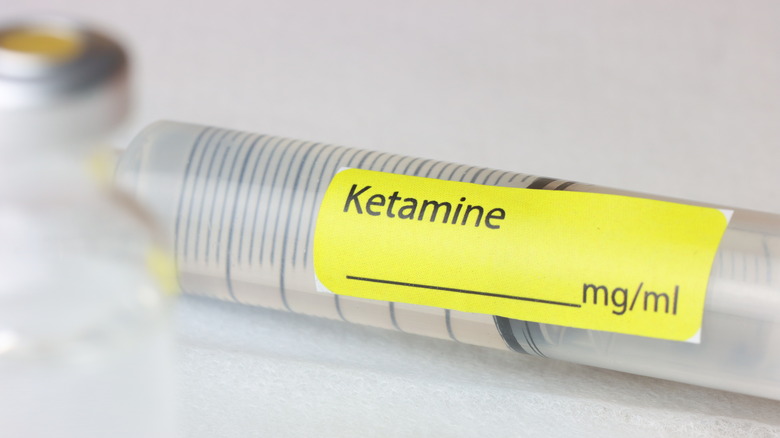Matthew Perry's Death Investigation Is Almost Over But It's Getting Serious
When "Friends" actor Matthew Perry died in October 2023, many people were concerned that substance abuse might have played a role. Given Perry's past addiction issues, summarized by him in The New York Times in 2022 as "55 Vicodin" a day, that was a reasonable concern. However, it looked like Perry's drowning in his pool at his home in Los Angeles was just an accident, and that's exactly what the County of Los Angeles Department of Medical Examiner said.
And yet, Perry's autopsy also led to some unanswered questions, especially due to "high levels of ketamine" in his blood, as People reported in December 2023. While it's true that Perry had been undergoing ketamine infusion therapy at the time – used to treat a host of disorders like depression, anxiety, PTSD, and more – ketamine only lives in the body for three to four hours. Perry's last treatment was a week and a half before his death.
Fast forward to the May 2024 and it turns out that the Los Angeles Police Department started an investigation into Perry's death as soon as the Los Angeles County Medical Examiner-Coroner finished its autopsy. Toward the end of June 2024, People reported that the LAPD is nearing the end of its investigation. The LAPD had been working with "U.S. postal inspectors" and the Drug Enforcement Administration (DEA) to try and track down the source of Perry's Ketamine. Now, "multiple people" might get brought up on charges.
Legal or illegal ketamine
Some people might be surprised to learn that legalized ketamine is even a thing. On the street, ketamine is known as "Special K," amongst other names. A Drug Enforcement Administration (DEA) ketamine fact sheet says that it comes in liquid or powder form, is commonly used in clubs to get high, and because it's such a potent sedative — even to the point of producing immobility — that it's also used as a date rape drug.
And because the line between legal and illegal drugs often comes down to distribution, ketamine is also a legalized therapeutic aid, like the ketamine infusion therapy that Matthew Perry received. As WebMD explains, medical ketamine took off in the 1960s as an anesthetic and remedy for suicidal ideations. As chief of psychiatry at Yale-New Haven Hospital John Krystal says, ketamine produces "feelings of unreality; visual and sensory distortions; a distorted feeling about one's body; temporary unusual thoughts and beliefs; and a euphoria or a buzz." The Pacific Neuroscience Institute describes how ketamine creates a "mystical" experience followed by an "afterglow" and rapid improvement in mood-based symptoms.
Such a powerful drug isn't without obvious dangers — like if someone dosed on ketamine and headed into a swimming pool. Aside from possible physical side effects like liver damage (per the NHS), the FDA says that controlled ketamine users are at serious risk for abuse. For a person like Perry with a history of substance problems, the risk might have been too high.
A concluding investigation
Given the high levels of ketamine found in Matthew Perry's blood during his autopsy, the three to four-hour life of ketamine in the body, Perry's previous ketamine infusion therapy being one-and-a-half weeks prior to his death, his difficulties with substance abuse, and the LAPD's collaboration with U.S. postal inspectors, a rational theory could be that in between his ketamine-infusion therapy sessions Perry got some extra, non-prescription ketamine from an unknown source delivered via mail to his Los Angeles home. He used it and it made him sedate to the point where he drowned in his pool.
If true, then the LAPD indeed has some folks to track down. Even if Perry's manner of death was accidental — meaning neither he nor anyone else intended for him to die — ketamine is illegal outside of controlled medical spheres. Someone made the ketamine that led to his death, someone sold it to him, maybe sent it to him, etc. Hence the LAPD's statement that it's looking to charge "multiple people" with some crime or another.
While it's possible that Perry might have gotten some extra ketamine from a medical organization, there's no reason to believe that he couldn't have acquired illicit ketamine. The DEA's ketamine fact sheet says that some folks get ketamine illegally from veterinary clinics, where it's still often used as an anesthetic for animals of all types: dogs, cats, apes, horses, zoo animals, and more. At the time of this writing, we have to wait for authorities to finish their investigation to know more.


